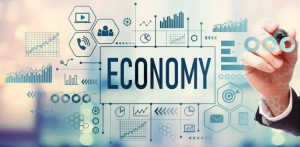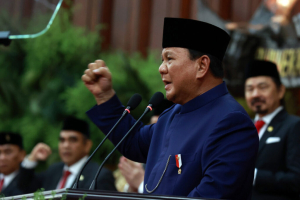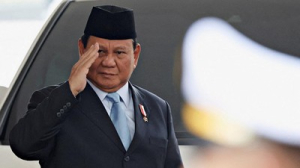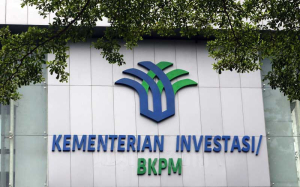“Sumitronomic” still relevant amid today’s challenges: Experts
Experts have emphasized that the economic framework developed by Prof. Soemitro Djojohadikoesoemo − known as “Sumitronomic” − is still relevant amid today’s global geopolitical and economic challenges.
Former rector of the University of Indonesia, Ari Kuncoro, said that the economic framework by Soemitro − a finance minister in Soeharto precidency and father of current President Prabowo Subianto − remains highly relevant in navigating the modern world’s volatility, uncertainty, complexity, and ambiguity.
“Policymaking today is like a strategic game played by various actors across nations. Negotiation and evidence-based policies are essential to prevent conflicts, such as trade wars, from escalating uncontrollably. Without careful coordination, economic rivalries could spiral into damaging multi-player conflicts,” Kuncoro said while addressing a panel discussion titled “Soemitronomics: Ideas, steps, and economic influence of Soemitro Djojohadikoesoemo” in Samarinda, East Kalimantan on Wednesday, June 4, 2025.
The discussion was held by the Indonesian Economists Association (ISEI), in collaboration with Statistics Indonesia (BPS), East Kalimantan Regional Office of the Indonesian Central Bank (BI), Mulawarman University, ISEI Samarinda Branch, and East Kalimantan Regional Development Bank (BPD Kaltimtara).
Kuncoro highlighted that Sumitronomic continues to underpin Indonesia’s development priorities, including building a strong agricultural and industrial base, fostering a robust domestic middle class, and enhancing internal supply chains. Strategic patience, policy consistency, and investments in innovation and human capital are crucial to reducing production costs and improving competitiveness.
He also noted Soemitro’s early vision for international academic collaboration as a model for today’s standards in evidence-based policymaking. This approach, inspired by Nobel laureate Jan Tinbergen, emphasizes adaptive and sustainable development through continuous feedback and improvement.
These insights reaffirm Sumitronomic as a vital economic philosophy for Indonesia to face ongoing geopolitical and economic challenges effectively, he said.
Prof. Ahmad Erani Yustika, Special Staff to the Vice President for Economics and Finance, said Sumitro's legacy remains vital to address inequality.
“Sumitro Djojohadikusumo’s ideas remain profoundly relevant today as we face ongoing challenges of unemployment, rural underdevelopment, and economic disparity,” Erani said.
He emphasized that economic development must prioritize rural communities and small enterprises through strong cooperative institutions. “Economic empowerment must align with cooperative control. Strengthening village economies is inseparable from institutional reform,” he cited.
Erani described Sumitro’s economic philosophy as grounded in five pillars: the inseparability of economics from politics, the essential role of the state as a development agent, job creation and equitable distribution, mobilization of domestic resources for industrial progress, and the central role of cooperatives in rural development.
“Sumitro did not believe in laissez-faire. He argued that in underdeveloped regions, governments must play a more active role in guiding production and investment,” he said.
“His approach is closer to Keynesianism, but with a deeper structural perspective relevant for developing nations.” he added.
Erani said further, however, that Sumitro was pragamatic on fiscal policy. He warned against excessive budget deficits, but supported active state spending during crises. He also rejected excessive regulatory control, arguing it often led to economic inefficiency and inflated business costs.
Erani also highlighted Sumitro’s nuanced views on agrarian reform. “He supported land reform, but warned it wouldn’t succeed if peasants remained trapped in rent-seeking debt economies. That’s why he proposed industrialization and transmigration as parallel strategies,” he said.
Erani was of the opinion that Sumitro’s legacy should guide Indonesia's economic transformation.
“Policy bias toward the people is a necessity, but it must be executed with technocratic logic and measurable targets. Empowerment must strengthen both individuals and grassroots organizations,” he concluded.
Meanwhile, BPS chief Amalia Adininggar Widyasanti, said Indonesia’s economic resilience rooted in long-term strategy, emphasizing that Indonesia’s resilience amid global uncertainties reflects the deep roots of national development shaped since the early independence era.
“In 2024, our economy grew by 5.03 percent with inflation stable at 1.60 percent. We’ve maintained a trade surplus for 60 consecutive months,” Widyasanti said, citing official data.
She highlighted that Indonesia is now classified as an upper-middle income country and remains the only ASEAN member of the G20.
She underscored the relevance of Soemitronomics, particularly the emphasis on industrialization as the pillar of national independence.
“Industrialization is crucial to escape the middle-income trap and build a resilient middle class,” Widyasanti said.
She cited that Soemitro envisioned strong and active role of the state in driving industrial growth, especially through investment in basic industries and infrastructure.
Widyasanti traced Indonesia’s economic transformation back from pre-independence period, when agriculture and plantations were the mainstay, to the oil boom-fueled industrial expansion of the 1970s and 1980s. “We used that momentum to develop state-owned industries in steel, cement, fertilizers, and aviation,” she said.
However, she warned against overreliance on commodity exports, citing the decline in global market shares of traditional exports like rubber, sugar, and tea. “A commodity-based economy is inherently temporary. Innovation and technology are essential for sustainable productivity,” she stressed.
As a case in point, she pointed to the success of nickel downstreaming. “Thanks to the ban on raw ore exports and policy push for local smelters, processed nickel exports have surged,” she said.
The development of the Galang Batang Special Economic Zone in Bintan, Riau Islands, was also presented as a successful model where industrial growth boosted regional GDP and job creation.
Widyasanti called for stronger commitment to economic census participation and data-driven policymaking.
“Economic policy must reflect the interests of the people and the state. That was Soemitro’s principle, and it remains valid today,” she said.
Already have an account? Sign In
-
Start reading
Freemium
-
Monthly Subscription
20% OFF$29.75
$37.19/MonthCancel anytime
This offer is open to all new subscribers!
Subscribe now -
Yearly Subscription
33% OFF$228.13
$340.5/YearCancel anytime
This offer is open to all new subscribers!
Subscribe now







